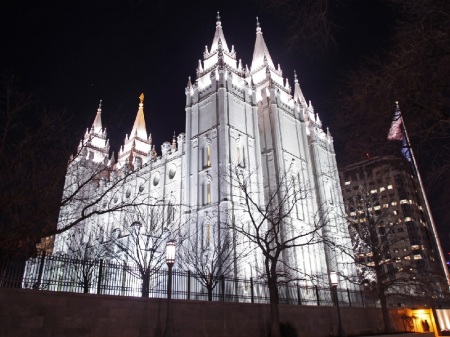LDS Church pressed struggling members for tithes despite $100b stockpile, whistleblower says

Despite amassing some $100 billion dollars in accounts meant for charitable purposes, the Church of Jesus Christ of Latter-day Saints pressed struggling members to tithe while bailing out a church-run insurance company and a shopping mall with billions, a new whistleblower complaint to the Internal Revenue Service alleges.
The confidential complaint was filed at the IRS on Nov. 21 by David A. Nielsen, a 41-year-old Mormon who worked as a senior portfolio manager at the church’s investment division, a company named Ensign Peak Advisors until September. A copy of the report was obtained by The Washington Post which shared details from the complaint.
Nielsen’s complaint, The Washington Post said, sharply criticizes church leaders for continuing to ask for tithes, even from members who are struggling financially, while the church hoards it’s impressive fortune.
“Would you pay tithing instead of water, electricity, or feeding your family if you knew that it would sit around by the billions until the Second Coming of Christ?” he wrote in a 74-page narrative that accompanied his complaint, according to the Post.
Some $2 billion from Ensign has been used over the past decade to bail out church-run insurance company, Beneficial Life, and a shopping mall in Salt Lake City, which was a joint venture between the church and a major real estate company, the report said.
In addition to accusing church leaders of using tax-exempt donations to bail out the two businesses, it accuses church leaders of misleading members by stockpiling their surplus donations instead of using them for charitable works. This allegation suggests a possible breach of federal tax rules.
Nonprofit organizations, including religious groups, are exempt in the United States from paying taxes on their income. Ensign, the Washington Post notes, is registered with authorities as a supporting organization and integrated auxiliary of the Mormon Church.
While Ensign, due to its exempt status, is required to operate exclusively for religious, educational or other charitable purposes, Nielsen argues that the firm has not met that criteria. He also alleges that the firm could owe billions in unpaid taxes and is urging the IRS to strip the organization of its tax exempt status.
Nielsen’s twin brother, Lars P. Nielsen, a healthcare consultant in Minnesota who helped prepare the complaint to the IRS, said his brother was “dejected” by the manner in which the church has been operating.
“Having seen tens of billions in contributions and scores more in investment returns come in, and having seen nothing except two unlawful distributions to for-profit concerns go out, he was dejected beyond words, and so was I,” Lars Nielsen wrote.
Church spokesman Eric Hawkins said in a statement that: “The Church does not provide information about specific transactions or financial decisions.”
Nielson suggested that the church continues to collect tithes despite their fortune to avoid “losing control over their members’ behavior” by releasing them from their financial obligations.
Nielsen’s estimate of Ensign’s assets, according to The Washington Post, places the firm among some of the country’s wealthiest companies and charities. Microsoft, Alphabet and Apple each hold between $100 billion and $136 billion in cash, according to the most recent company filings. Harvard University has the country’s largest academic endowment at $40.9 billion while the Bill and Melinda Gates Foundation is the largest private philanthropic foundation in the world at $47.8 billion the publication noted.
A Q&A on the church’s website however, explains the need for healthy financial reserves.
“Church members are taught to ‘gradually build a financial reserve by regularly saving [a portion of their income]’ …. The Church applies this same principle in its own savings and investments,” church leaders argue.
“In addition to food and emergency supplies, the Church also sets aside funds each year for future needs. These funds are added to Church reserves, which include stocks and bonds, taxable businesses, agricultural interests and commercial and residential property. Investments can be accessed in times of hardship or to meet the emerging needs of a growing, global faith in its mission to preach the gospel to all nations and prepare for the Second Coming of Jesus Christ,” they add.





















